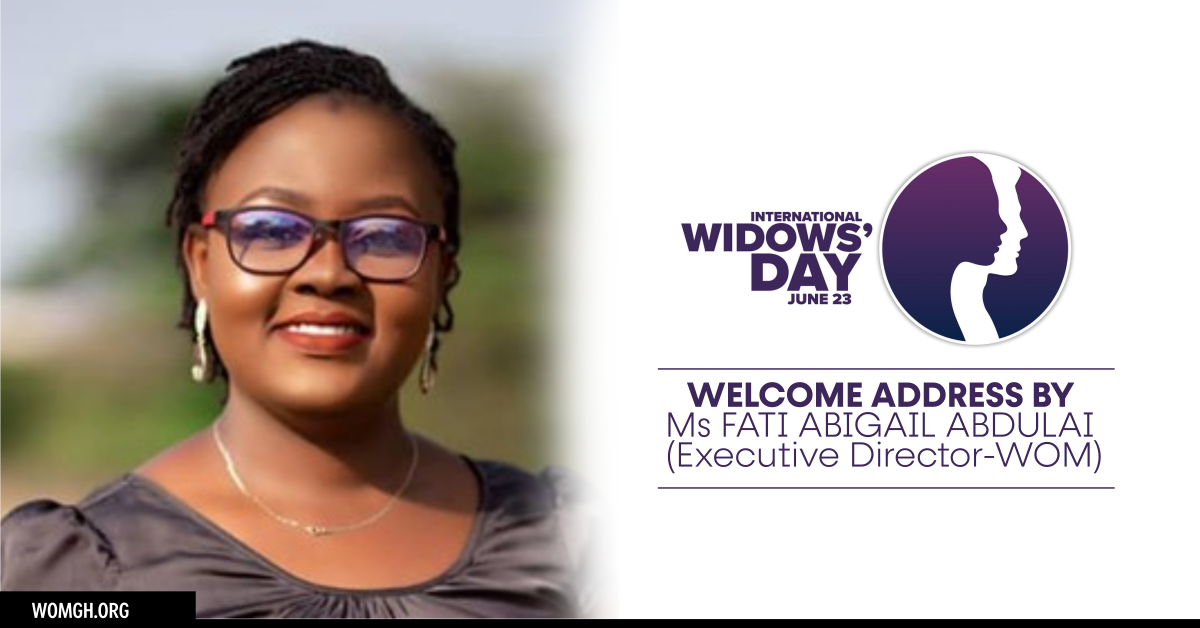- Today is International Widows Day and WOM is marking it with an event at the Catholic Social Centre in Bolgatanga.
- Below is the welcome address delivered by Our Executive Director, Ms. Fati Abigail Abdulai at the event.
Honourable Chair, the Regional Minister, The president of the Upper East Regional House of Chiefs and his elders, heads of department present, other CSOs and NGOs present, media, gallant widows, ladies and gentlemen.
Today marks twelve years since the United Nations General Assembly adopted the 23rd of June as International widows’ day to address poverty and injustice faced by widows and their children around the world.
According to the 2021 population census conducted in Ghana, eighty-seven per cent (87%) of the widowed population is female. These widows find themselves in seventy-five (75) ethnic groups in Ghana that discriminate against them in one way or another. The Upper East Region is estimated to have 61,725 widows and ranks sixth out of the sixteen (16) regions of Ghana in terms of widowed population. Data from the Ghana National Household registry in 2018 shows that seventy-five per cent (75%) of widows in the Upper East region are either poor or extremely poor, while sixty-one per cent (61%) of employable widows are unemployed. Widowhood has become synonymous with destitution and is unacceptable. With these statistics, if nothing is done, widows and their children will remain in a poverty loop. They, their children, grandchildren and great-grandchild will stay in poverty.
The work done by the Widows and Orphans Movement (WOM) since 1993 continues to show that the state of poverty and marginalisation experienced by widows and their children is linked with some injurious widowhood rites and practices. This has been the basis of the advocacy for the modification and or abolishment of some of these rites and practices that do not uphold the dignity of people.
Over the years, WOM with support from state and non-state actors especially the house of chiefs have made progress in the modification of some of these rites and practices. E.g. today widows can wrap themselves with a cloth instead of being naked during the performance of some of the rites; widows can resist forced marriage; among others.
Honourable Chair, the journey has been slow and lengthy with partial success. It is against this backdrop that we seek more sustainable solutions. Hence the theme for this year’s commemoration is “Sustainable solutions to ending dehumanizing widowhood rites”
Article 26 subsection two (2) of the 1992 constitution of Ghana states that “All customary practices which dehumanise or are injurious to the physical and mental well-being of a person are prohibited”. It tasks the National House of Chiefs under Article 22 subsection 272 C to “undertake an evaluation of traditional customs and usages with a view to eliminating those customs and usages that are outmoded and socially harmful”.
Honourable Chair, it is on this basis that the Widows Network together with WOM has put together some widowhood rites to be presented to the House of Chief and the Regional Coordinating Council to facilitate this mandate. We remain an eager ally willing to work with the House of chiefs to truly advance sustainable solutions to these injurious rites. We humbly request that the issues raised are given the needed attention they deserve.
On behalf of the Board, Management, Staff and gallant widows and orphans, I welcome you all.
Thank you.


